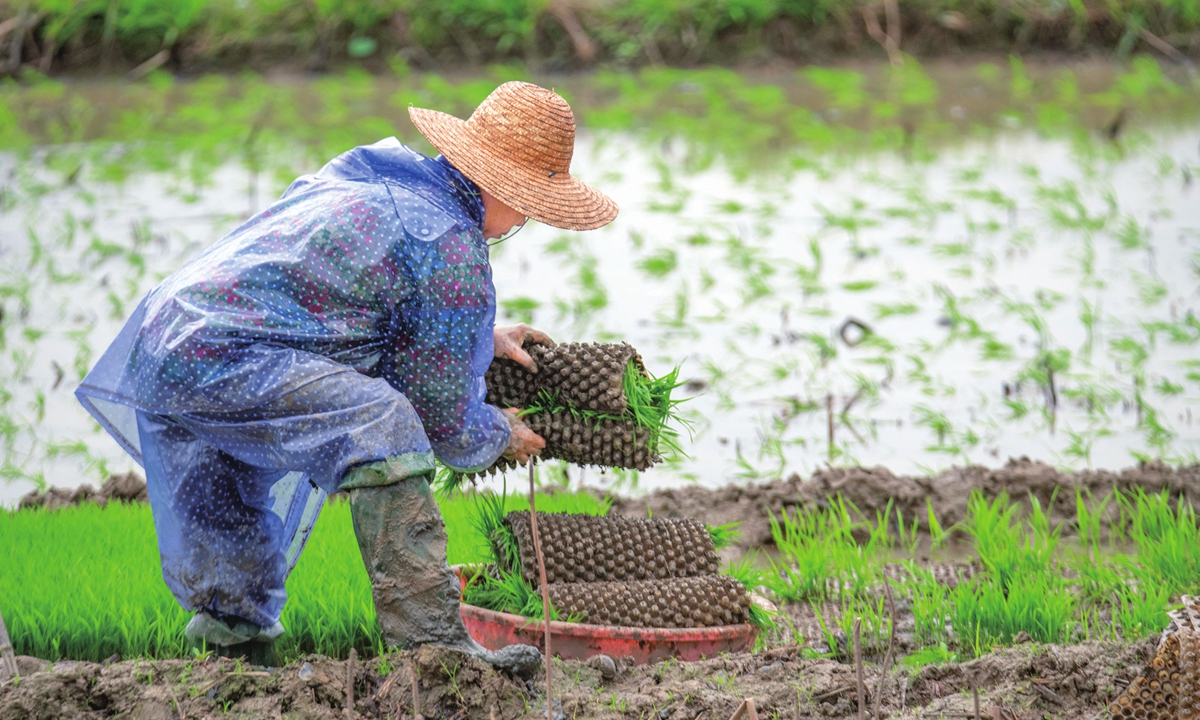China likely to issue first safety certificates for transgenic seeds by end-2021: analyst

Farmers plant seedlings in the fields in Qionghai city, South China's Hainan Province on December 26, 2021. Local farmers are stepping up early rice transplanting as the temperature is about to drop in the coming days. Photo: cnsphoto
Chinese regulators are likely to issue the nation's first batch of safety certificates for genetically modified seeds by the end of 2021, in a bid to boost the commercialization and standardization of transgenic germplasm, an analyst said on Monday, after the central rural work conference held over the weekend stressed food security.
Prior to the key policy meeting, China adopted the revised Seed Law on Friday, which will take effect from March 1, 2022.
The law will boost the commercialization and standardization of genetically modified (GM) germplasm. The first batch of safety certificates for GM seed will be issued by the end of this year or in early 2022, Wang Gangyi, a professor at Northeast Agricultural University, told the Global Times on Monday.
"The first batch of GM seed certificates is expected to go to soybeans and corn used as raw materials for biomass. Both products are in short supply, and transgenesis can boost yields," said Wang.
According to official statistics, China imported 100.32 million tons of soybeans in 2020. To grow that much would take about 500 million mu (33.3 million hectares) of land for non-GM varieties, accounting for 26 percent of China's total cropland of 1.92 billion mu.
The Ministry of Agriculture and Rural Affairs issued safety certificates for GM products in 2020 and 2021, but mainly for cotton, soybeans and corn varieties that are resistant to insects and herbicides.
Jiao Shanwei, editor-in-chief of industry news website cngrain.com, said that the next issue for China to tackle in the seed industry is GM technology, which can ensure the stability of output and prevent risks.
"Our research strength in GM is still relatively behind. In recent years, efforts in crop protection and development have not kept pace with demand," Jiao told the Global Times on Monday.
The amendment of the Seed Law also focuses on strengthening the protection of intellectual property rights (IPRs), including the establishment of a mechanism for essential derived varieties, expanded protection for new plant variety rights, and an improved system of infringement and compensation for seed IPR.
"The revised law is basically in line with international standards. It is a huge incentive for seed companies with high investment in research and development," said Wang.
Share prices of some agriculture companies were up by the daily limit on Monday morning, with agricultural-related stocks closed higher.
Analysts said that Chinese seed companies have only 5 percent of the global market. If China is to ensure food security, it needs 30 percent of the market, and the market values of Chinese companies are far too small, compared with global leaders.
Yuan Longping High-tech Agriculture Co, a leading agricultural company listed on the A-share, only had a market value of 32.79 billion yuan ($5.15 billion) by the end of the third quarter in 2021.


